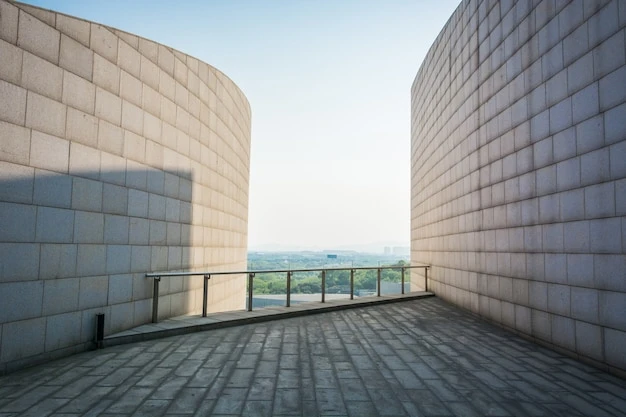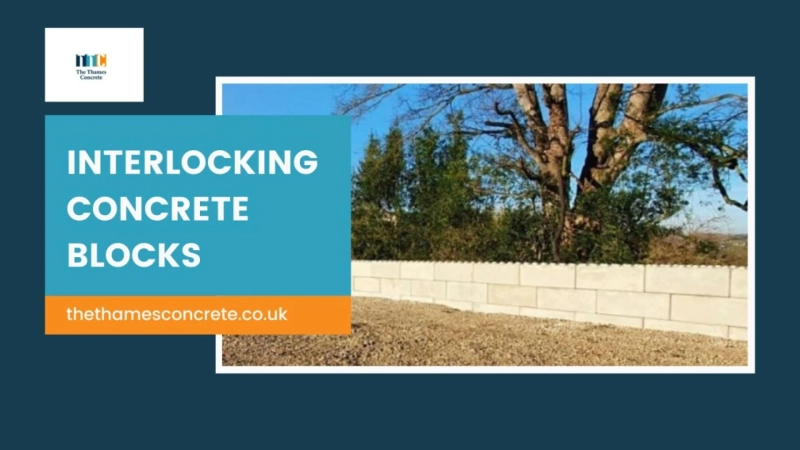Interlocking concrete blocks are a versatile construction material widely used for various applications due to their numerous benefits. These are typically made from high-quality concrete and feature a design that allows them to assemble together securely and create a solid and stable structure. This makes Interlocking Concrete Blocks the best choice for superior construction materials to enhance the aesthetic appeal and overall durability of the type of your construction.
Whether you\'re constructing retaining walls, foundations, or temporary structures, interlocking blocks provide a durable and practical solution to different construction projects. Join us as we explore the benefits of using these exceptionally durable blocks in construction and important considerations for informed decision-making.
Benefits of Interlocking Concrete Blocks For Construction

Here are its 5 key benefits and applications.
Simplified Installation Process
One of the primary ways in which interlocking blocks enhance construction is through their simplified installation process. With the assistance of skilled labour, interlocking blocks are assembled quickly and efficiently. They make use of efficient installation and time-saving techniques to assemble these blocks with precision. This helps save on construction timelines and additional labour expenses.
Exceptional Versatility
This is one of the standout benefits of using concrete blocks to enhance your construction. Its adaptability allows its best utilisation in diverse applications such as:
Flood Protection
These blocks work best in flood-prone areas as these serve as effective barriers to mitigate water damage and safeguard properties against potential damage. This benefits in creating a sense of safety and security during the potential periods of flooding and most importantly, the damages and disasters associated with them.
Traffic Barriers
Interlocking blocks are inherently sturdy and are durable to structural loads, mechanical damage, abrasion, and damage from adverse weather conditions. These best function as durable traffic barriers among highways and busy roads to ensure road safety and active traffic management.
Building Foundations
For both temporary and permanent structures, interlocking blocks form sturdy foundations and offer an efficient solution for construction projects. Their uniformity and interlocking design enhance structural integrity and reduce the risk of shifting due to uneven ground conditions and external forces.
High Structural Integrity and Stability

Interlocking blocks offer exceptional structural integrity and stability which contributes to the long-term safety of buildings and infrastructure. Their design creates a solid foundation that resists unequal movement and settlement in challenging ground conditions. Moreover, their modular nature allows for easy installation according to the requirements of the construction projects which further enhances their durability and resilience against several environmental factors such as weathering, erosion, and more.
Cost-Effectiveness
Interlocking blocks best ensure cost-effectiveness in construction due to their efficient installation process and minimal labour requirements. Their modular design allows for quick assembly which reduces labour time and saves on associated costs. Additionally, their durability and longevity significantly minimises the need for frequent maintenance or replacement, ultimately saving on long-term expenses. Moreover, their availability in various sizes and shapes facilitates optimal material usage which adds more value to the cost-effectiveness in construction projects.
Low Maintenance
Interlocking blocks require low maintenance, all thanks to their exceptional durability & resistance to wear and tear. Their sturdy design and interlocking mechanism minimise the risk of shifting or settling which significantly reduces the need for regular adjustments or repairs. Additionally, their robust materials withstand weathering and other environmental factors. This ensures that the blocks require minimal upkeep over time. This low maintenance requirement adds to cost savings and convenience, making them a practical choice for several construction applications.
Important Considerations For Right Interlocking Concrete Blocks
Identifying the right interlocking blocks for your construction project involves a thorough consideration of a variety of key factors:
Purpose
Determine the specific purpose of the concrete blocks you require for your construction project. Specify clearly if it is for retaining walls, erosion control, barriers, or any other applications. Keep in mind different interlocking block designs may be more suitable for different construction purposes.
Load-Bearing Capacity
Assess the expected amounts of loads the blocks will need to support. Consider factors such as block dimensions, material strength, and interlocking mechanism. This helps ascertain that the blocks you choose have sufficient load-bearing capacity to meet the requirements of your project.
Size and Shape
Consider the dimensions and shape of the concrete blocks you need to best fit the design specifications of your construction project. Remember some projects may require standard rectangular blocks. However, others require unique shapes or sizes to meet the needs of specific architectural or structural requirements.
Material Quality
It is beneficial to use interlocking blocks with good quality material. These offer greater resistance and durability to environmental factors. Thus, you must always inspect the quality of the concrete used in the blocks to choose blocks made from high-quality materials and ensure durability along with the longevity of the structure.
Interlocking Mechanism
Assess the interlocking mechanism of the blocks to ensure these provide secure and stable connections to best prevent shifting or dislodging over time. Consider looking for high-quality interlocking systems as these are popular for their ability to guarantee the structural integrity and longevity of your construction project.
Environmental Considerations
When considering the environmental impact of interlocking blocks on construction projects, take into consideration environmental factors such as Erosion, land degradation, floods, and more. Choosing blocks manufactured with eco-friendly processes and materials is advisable to minimise environmental harm.
Colour and Finish
Assessing the colour and finish of interlocking concrete blocks helps ensure that it enhances the overall aesthetics, visual appeal, and functional requirements of the construction project. Choosing options that complement the architectural design is advisable to ensure that it aligns with the project\'s overall vision and needs.
Supplier Reputation
Assess the supplier\'s reputation to ensure reliability and quality. Consider performing thorough research on the supplier\'s track record, customer reviews, and industry certifications to gauge their reliability. Additionally, consider their experience and adherence to quality standards to ensure consistent product performance.
Cost
Cost is an important factor to consider in your search for the right interlocking concrete blocks to suit your construction project needs. Take into account factors such as initial purchase price, long-term maintenance expenses, and overall project budget to make the right decision. Remember to evaluate the cost-effectiveness of different options available before you make a decision.
Conclusion
In conclusion, interlocking concrete blocks are indeed a strong and durable solution for modern construction needs. Their durability, versatility, ease of installation, exceptional structural integrity and cost-effectiveness makes them an ideal choice for retaining walls, flood barriers, and traffic management systems. Taking into consideration factors such as purpose, load-bearing quality, supplier market reputation, and the cost involved helps ensure optimal selection and utilisation of these blocks in construction projects.


